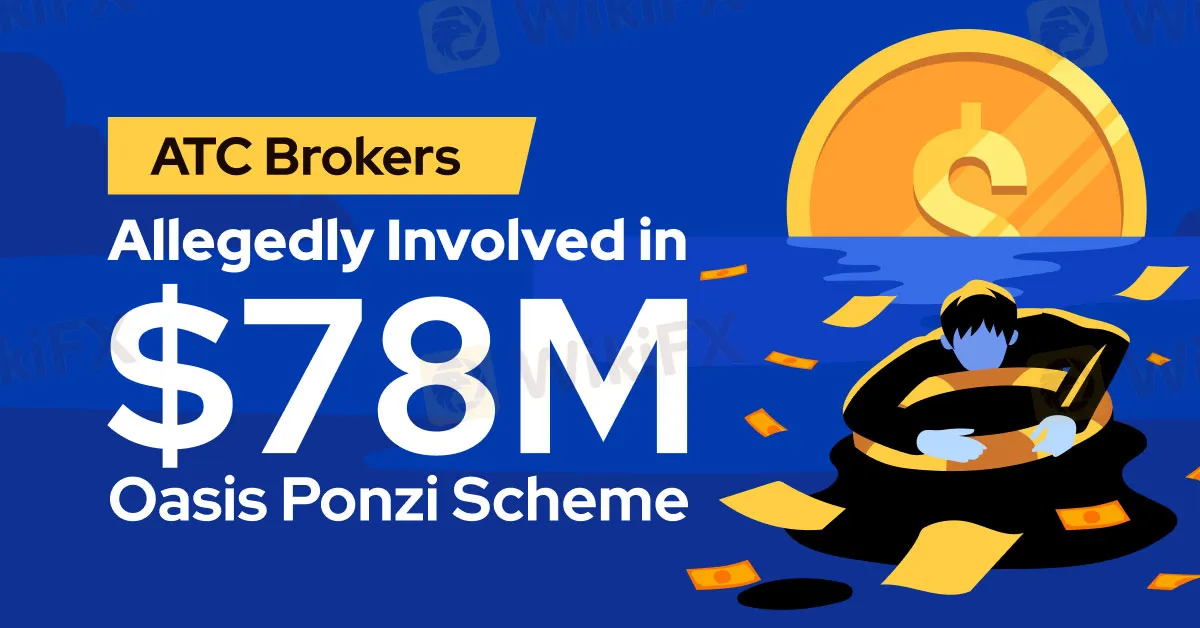简体中文
繁體中文
English
Pусский
日本語
ภาษาไทย
Tiếng Việt
Bahasa Indonesia
Español
हिन्दी
Filippiiniläinen
Français
Deutsch
Português
Türkçe
한국어
العربية
ATC Brokers Allegedly Involved in $78M Oasis Ponzi Scheme
Abstract:The legal battle surrounding Oasis, a fraudulent $78 million forex investment scheme, has shifted course as the court reconsiders a complaint against alleged accomplices, including ATC Brokers, amidst accusations of involvement in fraudulent transfers, shedding light on a complex Ponzi scheme that deceived investors with promises of high returns.

The legal proceedings concerning Oasis, a fraudulent scheme worth $78 million posing as a forex exchange investment fund, have taken a new direction as the court reversed its decision to dismiss a complaint against alleged accomplices, including ATC Brokers.
Burton Wiand, representing Oasis International Group as the receiver, filed a lawsuit against ATC Brokers Ltd., co-founder David Manoukian, and Spotex LLC, accusing them of involvement in fraudulent transfers. Initially, the district court dismissed Wiand's claims, citing lack of standing and statutory immunity under the Communications Decency Act. Wiand's objective was to recover assets for the investors who suffered losses due to the purported forex trading venture promising high returns.
Oasis International Group portrayed itself as an attractive investment opportunity, pledging substantial profits through currency futures trading. However, it was later revealed to be an elaborate Ponzi scheme, deceiving investors and causing financial harm. Despite promising high returns, Oasis operators concealed losses, misused funds, and distributed fictitious profits, as indicated in court documents.

The appeal filed before the US District Court for the Middle District of Florida challenged the previous dismissal, asserting that Wiand indeed had standing to pursue fraudulent-transfer claims. Although the court acknowledged Wiand's lack of standing for tort claims, it erred in dismissing those claims with prejudice and in addressing the issue of statutory immunity prematurely.
ATC Brokers, headquartered in England and Wales, facilitated trading activities for Oasis, while Spotex provided software to present false returns to investors. Wiand's legal pursuit targeted these entities, alleging their involvement in facilitating the fraudulent scheme's operations.
The court emphasized that as a registered forex broker, ATC Brokers was obligated to conduct due diligence before accepting potential traders. ATC Brokers' services allowed licensed foreign investment entities to trade on London markets on behalf of their underlying investor clients.
ATC Brokers' approval of Oasis' forex trading accounts and provision of liquidity reportedly enabled Oasis to engage in high-risk trading activities. Leveraging at 100:1, Oasis made substantial bets, ultimately resulting in significant losses, according to the court's findings.

Disclaimer:
The views in this article only represent the author's personal views, and do not constitute investment advice on this platform. This platform does not guarantee the accuracy, completeness and timeliness of the information in the article, and will not be liable for any loss caused by the use of or reliance on the information in the article.
Read more

FCA Warns Against Clone Brokers and Unauthorized Forex Firms in the UK
The FCA has flagged multiple clone and unauthorized forex firms, urging investors to stay alert. Learn which companies were named and how to avoid falling victim.

What Happens If You Trade on Illegal Forex Platforms in India?
There are many illegal platforms that offer financial services to clients. These scammers hide the risks involved because their main goal is to steal your money. That’s why it’s so important to understand the dangers of trading on illegal forex platforms

Exposing Trade Capital Limited - Siphoning Millions, Restricting Withdrawals, Charging Extra Fees
Trade Capital Limited is in the news for conducting bad practices as a forex broker. Check out the unethical practices employed by it to scam investors in this article.

5 Serious Warnings About Mirrox! You Can’t Afford to Ignore
Pay Attention! This is a serious warning you shouldn't ignore. Check out this article and know the 5 red flags about the Mirrox that every trader must be aware of.
WikiFX Broker
Latest News
MT4 vs MT5: A comprehensive comparison in terms of functionality
Top Forex Trading Strategies for the London Session
Swissquote Takes Full Control of Yuh Digital Finance App in Major Deal
Top 5 Forex Pairs Every Trader Should Have on Their Radar
What WikiFX Found When It Looked Into Decode Global
Treasury yields rise as Trump's new tariff rates in focus
Know the Major Risks of UbitMarkets, Before You Invest!
Trump's tariffs overshadow the pomp and pageantry as Macron meets King Charles
Boeing delivers most airplanes since late 2023 after ramping up 737 Max output
Inflation expectations drift back down to pre-tariff levels, New York Fed survey shows
Currency Calculator


